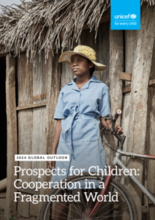Prospects for Children in 2024: Cooperation in a Fragmented World is the latest edition of the Global Outlook, a series of reports produced each year by UNICEF Innocenti – Global Office of Research and Foresight, which look to the key trends affecting children and young people over the following 12 months and beyond.
For 2024, the Global Outlook addresses cooperation in a fragmented world and examines the ways in which embracing cooperation in the face of growing global fragmentation will help protect the rights, lives and futures of children.
This Global Outlook shows how escalating competition among the world’s major powers has increased the prospect of conflict and sparked volatility in energy and food markets – all of which disproportionately threaten the rights, lives and well-being of children. Economic fragmentation has jeopardized hard-won progress reducing poverty and has threatened innovation and the global transition to green energy.
Democratic backsliding, disinformation and political violence pose threats, even in established democracies. While AI offers many benefits for children, unregulated technologies risk undermining child well-being. The multilateral system built to manage these risks has faltered, causing dissatisfaction over inequitable access to global public goods. But positive forces – such as political accountability, financing reforms and digital cooperation – offer hope. Collective action on strategic investments and proactive social policies can create more inclusive and resilient societies. Diplomacy and stronger peacebuilding mechanisms can prevent geopolitical rifts from escalating into warfare. Prioritizing the most vulnerable groups, especially children, in trade policy formulation and cooperation on commodity markets can ensure more equitable access to essential goods. A swift and just transition to green energy and carbon-zero emissions and collective management of global public goods offer promise for today’s children and future generations.
As we enter 2024, the world stands at a pivotal juncture. We can choose a path marked by increased global collaboration – a path that embraces innovation, knowledge sharing, policy transfer and equitable growth. Or we can go down a path that is less united and more protectionist, leaving countries to grapple alone with the consequences of climate change, conflict and resource constraints. The future of children globally will hinge on the interplay of these factors.

